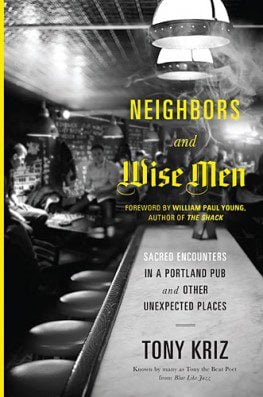What would you expect from a beat poet? Certainly not someone who stays on the beaten path. One of the ways in which Tony “The Beat Poet” Kriz goes off the beaten path as a Gen-Xer raised in the Evangelical Christian tradition is by finding spiritual value in what those from non-Christian traditions have to say and how they live. He wrote about this recently at Leadership Journal. It also shows in his book, Neighbors and Wise Men: Sacred Encounters in a Portland Pub and Other Unexpected Places. Here he differs from many Evangelicals from a previous era.
The other is by finding spiritual value in the Evangelical tradition in which he was raised and in closely aligning himself with his tradition, including its weaknesses. As an evangelist, Tony is shaped in part by his years with CRU (Campus Crusade for Christ) and holds a special place in his heart for the late Bill Bright. While he does not see them as exhaustive, Tony believes CRU’s Four Spiritual Laws are beneficial for evangelism and highlight key facets of the gospel. Not only though does Tony identify with what he takes to be strengths in the Evangelical tradition, but also he identifies with what he takes to be weaknesses and problematic forms of engagement in our witness to a watching world. In seeing value in traditional Evangelical institutions and also identifying with Evangelicalism in its weaknesses, he differs from many younger Evangelicals of the emergent sort today.
I have found Tony’s off the beaten path responses refreshing and missional. On the one hand, if we don’t see connections between Christians and those who don’t yet profess Christ, it is hard to build bridges for serious conversations about Jesus as the way, the truth, and the life. On the other hand, if we don’t value our own tradition and also identify with it in its weaknesses (such as how it has often demeaned the religious and sexual other over the years), we won’t be able to be taken too seriously by those beyond our movement’s walls. To be precise, if we think of ourselves as better than those who come before us, we show ourselves to be as or more self-righteous than they may have been and won’t be able to guard against falling prey to further abuse when it is least expected.
In these and other unexpected ways, I find The Beat Poet to be a great dialogue partner in helping the church go off the beaten path and engage other paths well in Christian witness.
This piece is cross-posted at The Institute for the Theology of Culture: New Wine, New Wineskins and The Christian Post.













